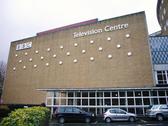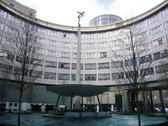Television Centre Should Be Listed, Says English Heritage
The famous Wood Lane building has an "iconic presence"
BBC Television Centre in White City should become a grade II listed building, according to a recommendation by English Heritage.
The organisation has advised the Minister for Culture, Media and Sport to recognise the building’s cultural and architectural significance.
“This building is not just architecturally important,” said Peter Beacham, the Protection Director for English Heritage. “As one of the first purpose-built television studios in the world, it represents the moment when Britain led Europe into the television age. The BBC itself is an important part of our British identity and Television Centre has acquired an iconic presence.”
Designed by architect Graham Dawbarn, BBC Television Centre was opened on 29 June 1960 as the BBC's first purpose-built centre for television production. Prior to that, the BBC had improvised by adapting other buildings originally designed for other purposes.
“The nation has an immense fondness for this building and what it represents for our culture. We all feel we know areas such as the Blue Peter garden and the studios where people have watched significant moments in broadcasting over the last 50 years, from early Doctor Who to Top of the Pops, Terry Wogan and Children in Need,” Peter Beacham said.
English Heritage is recommending that several parts of the complex gain Listed Building status. These include the scenery workshops, with their barrel-vaulted ceilings and rows of circular roof-lights, the light and airy 1950s canteen that overlooks the Blue Peter garden, and the distinctive circular drum that houses offices and the main studios.
This building has a 1950s design and its architectural features include mosaics, a gilded sculpture of Helios in the centre of the drum and the familiar pattern of atom-like discs on the front.
“We know the BBC is rightly proud of its building and its heritage, and we are enthusiastically working with them to make sure that marking TV Centre’s national importance will not affect its ability to adapt to changing technology or new uses,” Beacham said.
The Department for Culture, Media and Sport has to give its consent to the recommendation.
30 June 2008
Related links
|

